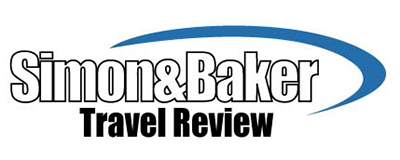by Editor | Apr 26, 2010 | Accomodations, Ecotourism, New Articles
Article and photos by Josette King

Thamalakane River Lodge lounge
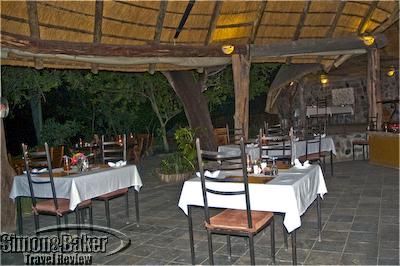
Thalamakane River Lodge dining room
As the gateway to the main safari areas in Botswana, Maun is often referred to as the tourism capital of the country. Its busy airport brings in passenger planes filled with tourists, most of whom are efficiently greeted at the exit gate by personnel from the various safari companies operating in the Okavango Delta and the Kalahari Desert. They are then handed over to the charter flight operators who take them to their ultimate bush destination. The same friendly greeters are there on the return to make sure that “their” tourists get on the correct flight to begin their journey home. That’s all most safari travelers see of Maun. For those who venture outside the airport grounds, the colorful chaos of an African boomtown awaits. The large African village that has been, for almost a century, the tribal capital of the BaTawana people (a predominantly pastoral society) and hub of the local cattle ranching industry, is morphing into a dynamic 21st century town.
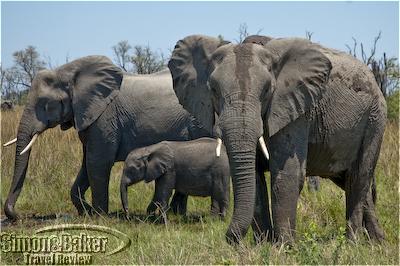
Elephants abound in the nearby Moremi Game Reserve
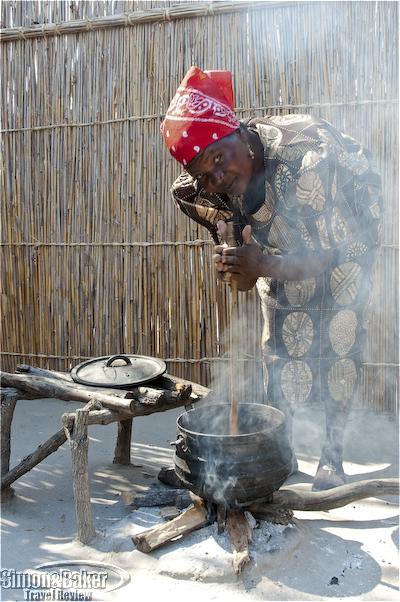
A Bayei tribeswoman prepares a traditional dish
In that still mainly roadless country the size of France, the broad, newly paved road that crosses the town on its northeastern way to the Moremi Game Reserve is a major lifeline. It is lined with new buildings freshly stuccoed in creamy shades of fruit sorbets. These are the offices of the numerous safari and air-charter operations that run trips into the Okavango Delta; or small strip malls catering to tourists, now the town’s main source of revenue. Flashy four-wheel drive vehicles zip through the bustling crowd. However, a few blocks in any direction from the airport and town center, the traditional southern African circular rondavels under peaked thatched roofs still hold their ground. Donkeys quickly become a primary means of transportation along the dusty dirt paths; and an invasion of goats stubbornly insist on their right of way.
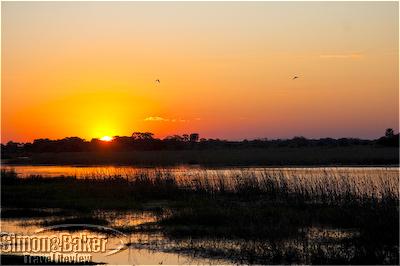
Sunset on the Thamalakane River
Around town and along the banks of the nearby Thamalakane River, a number of lodging options have developed to cater to visitors. There are mainly camp grounds or efficiency facilities for self-drivers, the hardy souls who rent four-wheel drive cars and set out on their own to explore the nearby game areas. Then, for the not-so-hardy souls who feel more at ease exploring in the company of an experienced safari guide, and like a lovely abode filled with creature comforts to welcome them at the end of the day, there is the Thamalakane River Lodge. I unabashedly declare myself in the latter category of travelers, and I thoroughly enjoyed my stay at the lodge.
Ideally located an easy 20-minute drive from Maun Airport, Thamalakane River Lodge was a secluded haven of tranquility nestled in a grove of mature riverine trees on a bank of the river. My well-appointed stone and thatch guest chalet had a private veranda with a sweeping view of the river, as did the main lodge. The dining room offered a varied à-la-carte menu of well-prepared dishes. The staff was warm and attentive. It was a delightful place to come home to after days spent visiting the Moremi Game Reserve or the watery world of the Okavango flood plain. Click here to read more about my visit the southern-most part of the Okavango Delta and the Thamalakane River Lodge.
by Editor | Apr 19, 2010 | New Articles, Restaurants
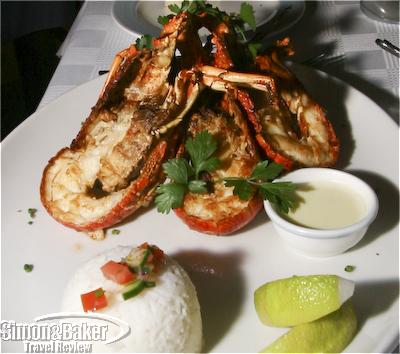
Grilled langoustines at SeaFood
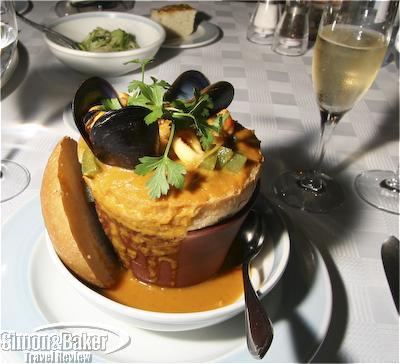
Bunny Chow, a Cape Malay seafood curry at The Marine Hermanus
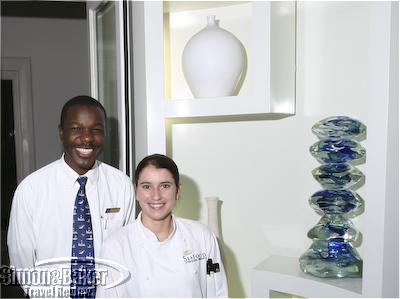
Major Moyo, manager, and Delia Harbottle, chef, at SeaFood
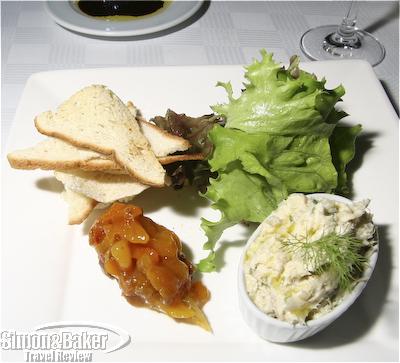
Traditional snoek paté with crisp bread and chutney
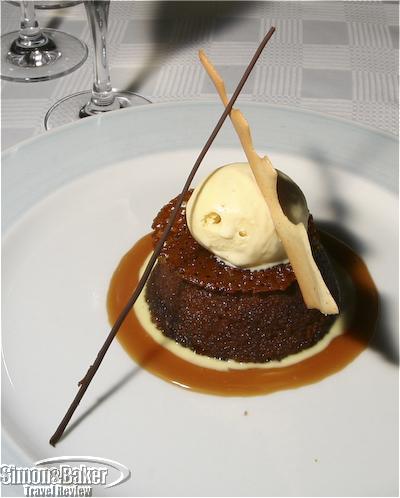
Malva Pudding at SeaFood
Situated in front of the Raed Na Gael Mountains and within the picturesque seaside village of Hermanus in South Africa The Marine Hermanus hotel faces a bay where, during the season, southern right whales are often seen. Our team was there in hopes of spotting some of the whales and discovering the renovated historic hotel.
They especially liked SeaFood, an informal restaurant near the entrance of the hotel serving contemporary sea fare with an emphasis on fresh catch from Walker Bay. It was established after the hotel owner, Liz McGrath, paid a chance visit to the seafood counter at Harrod’s in London.
The restaurant, open for lunch and dinner, had an open kitchen and contemporary décor including a floating glass wall panel with a wave design, subtle warm lighting, bold graphic pots, black and white photography, and a glass sculpture. Click here to read our dedicated article on The Marine Hermanus.
by Editor | Apr 12, 2010 | Accomodations, Ecotourism, New Articles
Article and photos by Josette King
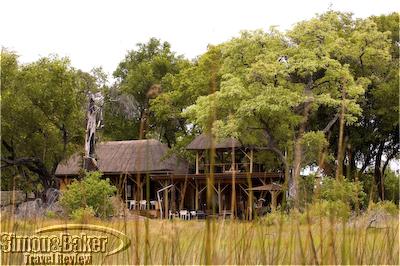
The lodge at Xudum
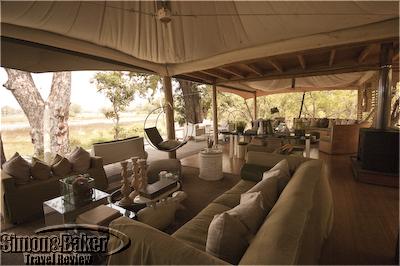
The lounge at Xaranna
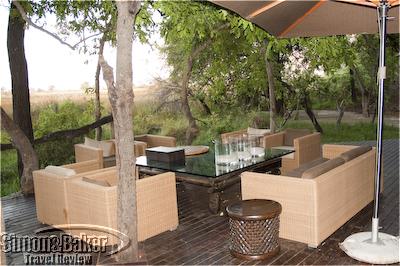
The deck at Nxabega
My first experience of the exceptional hospitality of the staff of &Beyond Botswana occurred two weeks before I was scheduled to enter their fold. It was my first visit to Botswana. I had just landed in Maun, the gateway to the country’s main safari destinations, on my way to the Kalahari Desert. It quickly became obvious that contrary to the assurances I had received from the organizers of the first leg of my itinerary, nobody was on hand to meet me.
A young man in the crisp khaki garb of safari operators, having doubtless noticed in my eyes the disoriented look of the unclaimed tourist, kindly offered his assistance. I explained my situation and within minutes he was orchestrating my rescue. Once he was assured that my host company was on its way, he sat with me for the next hour until he could personally hand me over to the pilot of the chartered flight that was to take me to my destination. It was not until then that I glanced at his nametag. My savior was Palo Moriri of the local &Beyond Botswana office.
I returned to Maun Airport two weeks later to wrap up my itinerary with three stops in the heart of the Okavango Delta. Each was an &Beyond Botswana property. Palo was waiting for me with the warm smile of an old friend. In no time I was on my way to Nxabega (pronounced Na-ber-rah, he informed me). Xudum (pronounced Kudum) and Xaranna (Ka-rha-nah) followed. While each had a distinct personality, all three were outstanding in their location (remote conservancies rich with wildlife), the luxury of their accommodations and, most of all, the quality of their hospitality. The superb service delivered by every member of the staff spoke well for the excellence of their training. Their enthusiasm in making sure that I would enjoy every instant of my stay with them was obvious. However, what struck me was the pride everyone took in being a part of the &Beyond community and in welcoming me to it.
Property managers told me about the company’s motto: ”Care of the Land, Care of the Wildlife and Care of the People,” and how they endeavored to live up to it within their camps. They mentioned that internal eco-audits, conducted periodically to ensure best operating practices, are maintained to minimize the impact of their operation upon the environment. And they happily pointed to success stories within their staff, of team members rising through the ranks thanks to internal mentoring and their own eagerness to excel. One such young man, my guide at Xudum, Ona Basimane, told me how, after joining &Beyond as a tracker in 2008, with the support of the camp’s head guide, he had succeeded in completing the guide licensing exams in a year’s time (the process usually takes at least three years). “There is a great guiding culture at &Beyond,” Ona said. “My aim is to become a guide trainer; mentor others and give back to the company.”
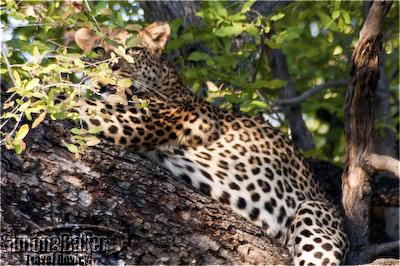
An exciting leopard sighting at Nxabega
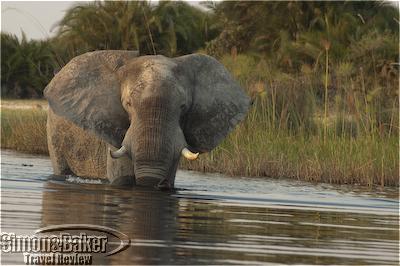
An elephant wades into the lagoon for a closer look at us
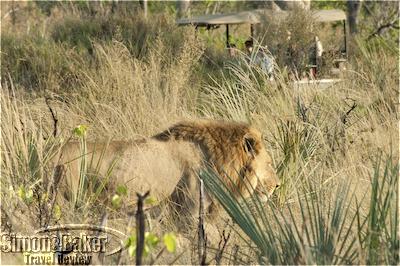
A lion sighting on a morning game drive
I was told that guides are encouraged to share their knowledge not only with the guests or their own colleagues, but also with the local conservation organizations. At Nxabega, my guide, Maxy Tidimalo, explained the importance of birds as an environmental indicator, and how he and his colleagues were monitoring the endangered wattle crane and slaty egret. They were gathering data for BirdLife Botswana as part of a program to understand the population dynamics and ecological the requirements of wetland-dependent species.
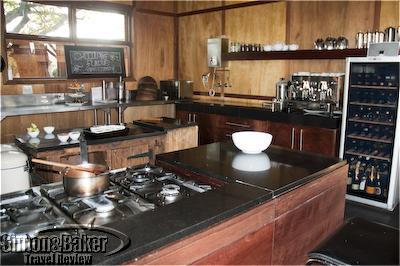
The kitchen at Xudum
I noticed the same sense of purpose among the household staff. In the Xudum kitchen, Chef Pauline Tjetjoo and Charity, the sous-chef, were excited to introduce me to Amanda Collins, the training chef, who was at the lodge on her periodic round to help kitchen staff polish their skills and add new recipes to the menu. Several butlers confided they were training to become trackers or assistant managers. But that didn’t distract them from pampering me. When I arrived at Xudum, I found the icebox in my suite stocked with my favorite beverage. When I asked my butler Itumelang how she knew, she explained that when guests came from other &Beyond properties, the butlers always shared this kind of information.
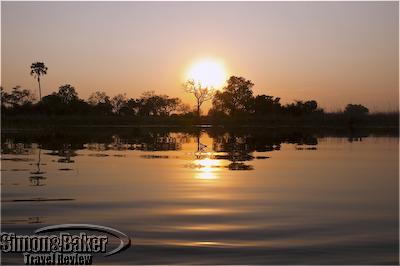
An Okavango sunset
I quickly became caught up in the excitement of the &Beyonders as the staff I met referred to themselves, and it added up to a richer wilderness experience for me. My enjoyment of these pristine conservancies and outstanding facilities was enhanced by the thought that by my visit I too was making a contribution, however small, to the care of the land, the wildlife and the people of the Okavango Delta. Click here to read more about my stay in Nxabega, Xudum and Xaranna
by Editor | Apr 5, 2010 | Accomodations, Ecotourism, Food and Wine, New Articles
By Elena del Valle, photos by Gary Cox
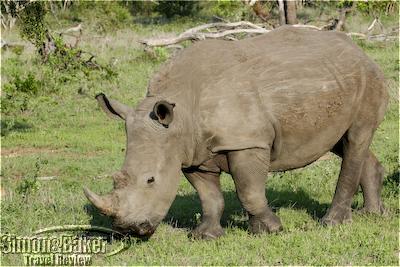
A white rhino at the Royal Malewane
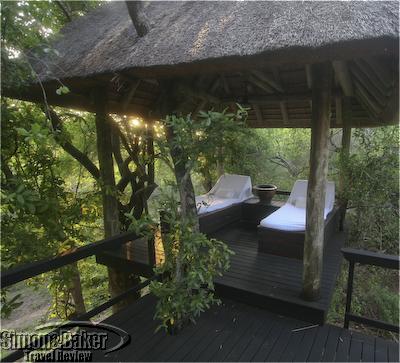
A relaxing corner of our suite’s private outdoor deck at the Royal Malewane
When I mention South Africa to people who haven’t been there I get one of two reactions, fear or excitement. Fear because of the country’s reputation for crime and excitement because it sounds exotic and fun to visit. For those who know about game viewing Africa’s southernmost nation is synonymous with luxury safaris. Others still are aware of the country’s nascent wine industry and gourmet inclination. Game viewing and visits to the wine region, to a lesser extent, are some of the main reasons international travelers find their way to South Africa.
For those willing to overlook the hateful crime statistics and brave the long flights to reach the far corner of the African continent the rewards are plentiful and an excellent value for money. Visitors with the means and desire to travel in style will find there are many luxurious accommodations to choose from including five-star hotels, lodges, and tented camps. When planning a trip, selecting an area of topical or geographic interest is a good first step. For some a familiar name, such as a chain hotel, may be reassuring.
Another possibility for the more adventurous is a boutique property. For guests wishing to sample a less uniform and more local experience small properties like lodges, camps and boutique hotels can be a godsend. Often these types of properties offer attentive customer centered service and many advantages over the larger hotels. Over time we’ve discovered several outstanding properties owned by the same company or family in various parts of the country offering excellent and distinctive luxury accommodations.
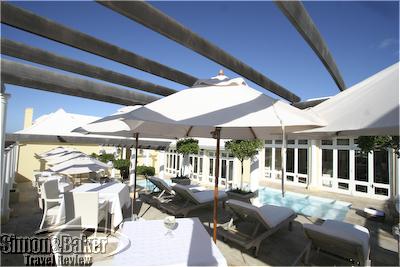
The inner courtyard with two pools at Birkenheadhouse
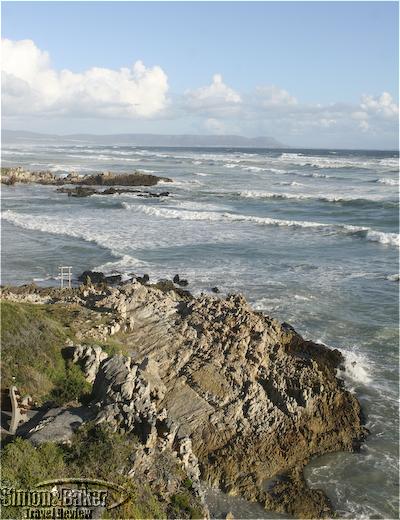
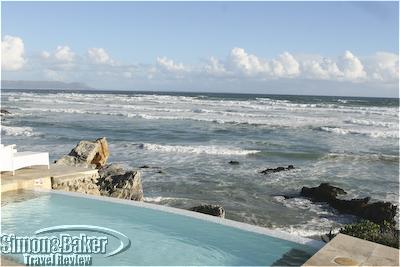
Views from the deck at Birkenheadhouse
An example of this is three properties that form The Royal Portfolio owned by Liz and Phil Biden. The couple successfully converted their vacation homes in different parts of South Africa into small luxury lodges. We have visited the three properties on two separate occasions. First, we were at the Royal Malewane and on our most recent trip we visited Birkenheadhouse and La Residence. Each is distinctive and has its own attractions.
We especially appreciated the outstanding service, comfort and luxury accommodations, attention to detail, superb whimsical décor, and strong foodie orientation they shared. They make an excellent circuit for those wishing to sample some of the best options South Africa has to offer for safari and whale watching destinations as well as for fine food and wine lovers.
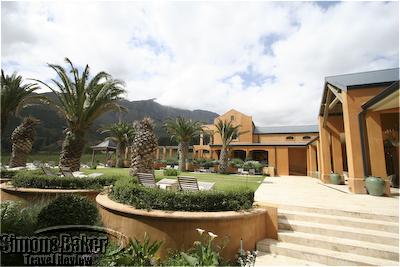
A side view of the central courtyard at La Residence
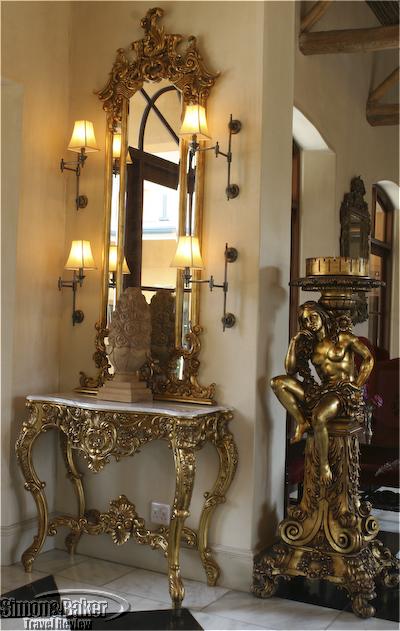
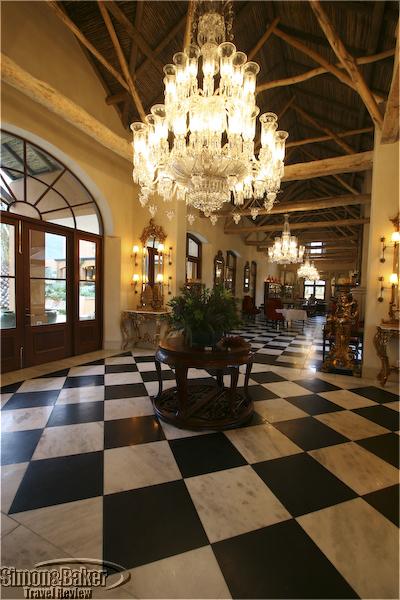
The main building interior at La Residence
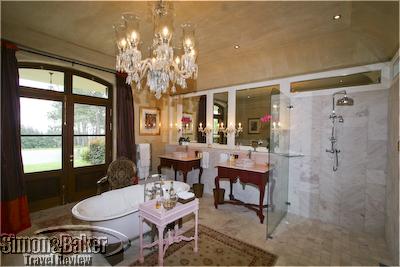
The romantic bathroom in the Hibiscus Suite
The Royal Malewane, an intimate luxury safari lodge with an on site spa near http://simonandbaker.com/kruger, has been host to international celebrities and politicos. Birkenheadhouse, a second property located in Hermanus on the coast east of Cape Town, is perched above the beach in a village known nationally for its seasonal whale watching opportunities. La Residence is our favorite for its over-the-top flair, beautiful setting within a farm estate and delicious meals. It is in the wine and gourmet town of Franschoek, a short drive from Cape Town.
